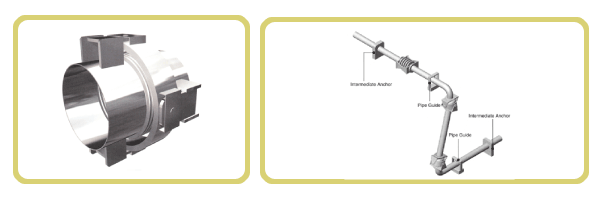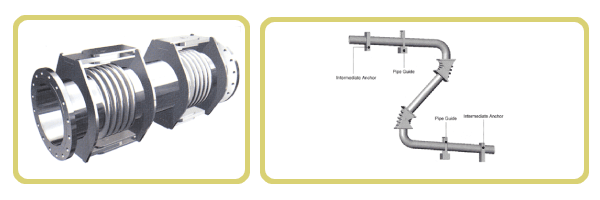|
|
|
|
 ............................ ............................ |

On the construction and function, this type of Expansion Joint
is very close to the hinged Expansion Joint. Basically, Gimbal
structure assembled with floating gimbal ring, pin & arms
must be designed to withstand against for bellows pressure thrust
and extraneous force. Also, it should have a structure permitting
bellows to absorb the angular rotation in any plane. To properly
function this type of Expansion Joint on piping-work, pair of
single gimbaled expansion joint, or additionally with one hinged
expansion joint, must be united to absorb a large movement in
similar with single hinged conjugated system.
1. Rated cycle life is 3000 cycles per EJMA 6th edition for
any non-concurrent movement tabulated.
2. To combine axial, lateral movement refer to page 4.
3. Maximum axial extension movement is 50% of tabulated axial
value.
4. To obtain greater movements of cycle life refer to page 4.
5. Catalogue pressure ratings are based upon a maximum bellows
temperature 800°F
Actual operating temperature should always be specified.
6. Maximum test pressure: 11/2 × maximum working pressure.
7. The overall length may be revised in accordance with the
type of Expansion Joint and other attachment. |
|
 ........................... ........................... |

This type of Expansion Joint is constructed with two Gimbaled
Expansion Joints for the purpose of absorbing lateral displacement
in multi plane system. As the same as double hinged Expansion
Joint, lengthening the intermediate pipe shell can make it become
available to absorb more large lateral displacement. Also, if
thermal growth from intermediate shell pipe is desired to be
absorbed within this type of Expansion Joint itself, SAMSUNGFLEX
is able to show a fitted design solution as well.
1. Rated cycle life is 3000 cycles per EJMA 6th edition for
any non-concurrent movement tabulated.
2. To combine axial, lateral movement refer to page 4.
3. Maximum axial extension movement is 50% of tabulated axial
value.
4. To obtain greater movements of cycle life refer to page 4.
5. Catalogue pressure ratings are based upon a maximum bellows
temperature 800°F
Actual operating temperature should always be specified.
6. maximum test pressure: 1 1/2 × maximum working pressure.
7. The overall length my be revised in accordance with the type
of Expansion Joint and other attachment. |
|
|
|